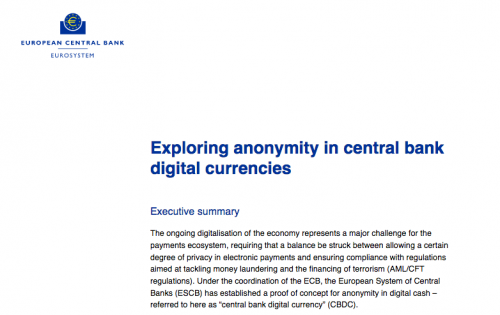Pioneering exploration of fiat currencies in European countries
Recently, a research report published by the European Central Bank (ECB, "European Central Bank") "Exploring anonymity in central bank digital currencies" showed that the European Central Bank is studying the central bank's digital Currency (Central Bank Digital Currency, CBDC) payment system.

As one of the most important central banks in the world, the European Central Bank is mainly responsible for the financial and monetary policies of the European Union's Eurozone. In this European Central Bank research report, the main concern is the European Central Banking System (ESCB) proof of concept (PoC) established for anonymity in CBDC. The proof of concept shows that it is possible to build a simplified central bank digital currency payment system that will allow a certain degree of user privacy while still ensuring mandatory anti-money laundering and counter-terrorism financing (AML / CFT) checks on large transactions.
However, the realization of this concept still has a series of problems that need to be improved. And the report's summary and introduction also mentioned that the report is part of the European Central Bank's technical study of the CBDC, and its main purpose is to promote a broader discussion of the topic, not for actual implementation, nor for the European Central Bank. Any decision to advance the issuance of the eurozone CBDC.
- Research Report | Survey on Blockchain Application of Charity
- How to value DCG with three core businesses: Grayscale, Genesis and CoinDesk?
- Legal analysis of smart contracts: What is the difference between smart contracts and traditional contracts?
Whether or not to issue a CBDC is still a policy issue. The European Central Bank said it will continue to analyze the CBDC to explore the benefits that new technologies can bring to European citizens and is ready to take action when needed in the future.
Among European countries, Switzerland and Sweden recently announced plans related to central bank digital currencies.
Swiss "Digital Cargo Franc" plan blocked again
Switzerland is one of the world's famous financial centers, and its developed financial industry has always been recognized by the international community. And Swiss banks ’world-renowned" trustworthiness "has driven a steady stream of wealth, such as UBS UBS, which is the world ’s second-largest private wealth asset manager, to a certain extent This represents Switzerland's leading position in international financial markets and private wealth management. And more importantly, in recent years, Switzerland has been recognized as one of the cryptocurrency friendly countries that are "open to financial innovation".
Previously, the headquarters of the Libra Association, a non-profit organization for stable currency governance initiated by Facebook, was located in Geneva, Switzerland. Switzerland's Crypto Valley, located in the low-tax area of Zug, is also known for its friendly environment for the cryptocurrency industry.
However, despite this, plans to implement the central bank's digital currency, the "Digital Cargo Franc", have once again been hindered.
Earlier, according to media reports, the Swiss stock exchange chairman Romeo Lacher had strongly suggested that a digital version of the Swiss franc be issued in the country to boost the local economy and accelerate the cashless process. At that time, the Swiss National Bank proposed that the “digital franc” was unnecessary, citing that “there are no potential problems in cash payments and cashless transactions in Switzerland that are worth solving with digital currencies”. The Swiss central bank director Thomas Moser has also said that cryptocurrencies and blockchain technology are too primitive and the Swiss central bank does not consider issuing digital francs.
With the rapid development of technology and ever-changing payment needs, and the increase in the relevant experience of central banks in digital currencies in other countries, it has also prompted central banks to re-evaluate the opportunities and risks of central bank digital currencies.
According to a press release posted on the official website of the Federal Council of Switzerland, at its meeting on December 13, 2019, the Federal Council approved a report on central bank digital currencies at the request of the National Assembly, The opportunities and risks of e-franc are reviewed.
Among them, according to the various reasons and expectations put forward by the public and experts for the introduction of central bank digital currencies, supporters hope that it will bring better payment and financial service channels to the general public and meet the public's Demand for digital currencies with default risk. Some economists predict that central bank digital currencies will make payments more efficient, make monetary policy more efficient, and make the entire financial system more stable. Its supporters also believe that central bank digital currencies can help reduce tax violations and money laundering.
The analysis of the report by the Swiss Federal Council shows that the central bank's digital currency cannot meet these expectations, or can only partially meet these expectations. The report pointed out that the impact of central bank digital currencies may depend on the design mechanism of central bank digital currencies, and, as with previous views, there are currently better solutions for most areas of central bank digital currencies.
Therefore, the Federal Council believes that the universal central bank digital currency still does not appear to bring additional benefits to Switzerland, and the Swiss National Bank (SNB, the Swiss National Bank) holds the same view. In addition, these government agencies also believe that the central bank's digital currency may also pose new risks to monetary policy and financial stability, which will constitute a major challenge in the future.
However, it is worth noting that the report made a new point of view: According to the current situation, further development of central bank digital currencies limited to financial market participants seems to be a more promising strategy. Because this limited and open digital currency will not, at least at this stage, have a profound and fundamental impact on financial markets like the universal central bank digital currency.
Swedish central bank to launch digital currency pilot
Compared to Switzerland, Sweden's position in the financial market is slightly inferior. However, industrially developed Sweden is one of the few countries except China that has explicitly proposed to issue central bank digital currency in the short to medium term, and is the only EU country that is considering issuing a central bank digital currency.
According to previous news from People's Daily, a survey released by the Bank for International Settlements shows that most central banks around the world are studying the issuance of digital currencies, and the central banks of a few countries, such as Sweden and Uruguay, have entered the pilot phase.
The official information of the official website of the Swedish Central Bank (Sveriges Riksbank) shows that the task of the Swedish central bank is to ensure the security and effectiveness of the payment system, but Sweden is currently one of the countries with the lowest actual cash usage in the world, and the current usage rate is still falling. In the future, most households and companies will no longer use cash as a payment method, and the task of the central bank to "guarantee the security and effectiveness of the payment system" may become more difficult. At the same time, technologies regarding digital currencies and payment methods are rapidly developing.
Based on the above considerations, the Swedish central bank launched a project in the spring of 2017 to study the issue of the central bank's digital currency, the so-called “e-crown”.
In April this year, it was reported that during the joint spring meeting of the World Bank Group and the International Monetary Fund (IMF) this year, the deputy governor of the Bank of Sweden Cecilia Skingsley said that the central bank will issue its own digital currency e-krona within the next ten years. The probability is more than 50%. In November, the governor of the Bank of Sweden outlined the six-step plan for implementing the central bank's digital currency, including:
1. It must be available 24/7 and can be paid anywhere regardless of the amount of money;
2. Cross-border transactions are necessary, and Swedish digital currencies must also be easily convertible into other suitable currencies;
3. Fiat currency laws must be updated to include digital currencies in their jurisdiction;
4. The digital currency will be issued directly by the bank itself and supervised by the Swedish Central Bank;
5. Digital ID will be accompanied by digital currency to prevent money laundering and improper use;
6. The physical cash must still be retained as a safeguard when the digital currency system fails

Although the Swedish central bank has not yet decided whether to issue a digital krona e-krona, but this time, also on December 13, the Swedish central bank issued an announcement that it would sign an agreement with consulting firm Accenture to provide digital currency e-krona for the central bank. Create a pilot platform.
The main goal of the pilot project is to expand banks' understanding of the technical feasibility of the central bank's digital currency e-krona.
Specifically, the project needed to propose a solution for the functionality of Digital Krone e-krona in a test environment. In the first year of the pilot, it is planned to develop a technology platform with a user interface that allows users to use digital kronor e-krona lang to make payments through mobile phones, bank cards, smart watches, etc. The pilot platform will also include simulations of payment service providers, retail stores, and other parts of the Swedish payment system.
In addition, the Bank of Sweden will continue to investigate whether the digital crown will affect Swedish legislation and the tasks of the Swedish central bank, as well as the economic demand of the digital crown and its impact on the Swedish economy.
We will continue to update Blocking; if you have any questions or suggestions, please contact us!
Was this article helpful?
93 out of 132 found this helpful
Related articles
- US SEC proposal proposes to expand the scope of "qualified investors"
- Inventory: Who will predict the price of Bitcoin in 2019?
- Global Blockchain Financing Track Top 20: 1,543 venture capital investments with a total funding of more than 79.2 billion yuan
- Satoshi Nakamoto's theory of the crypto market after the bulls' collapse?
- Perspectives | Five conjectures for the blockchain industry in 2020
- Blockchain can't save traffic NetEase circle and other products failure revelation
- Comment: Why did Satoshi Nakamoto give up being the richest man in the world?




